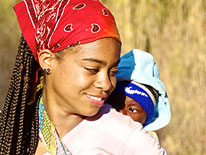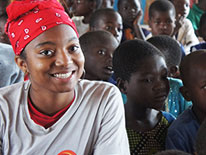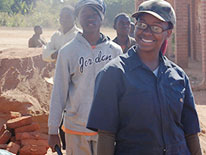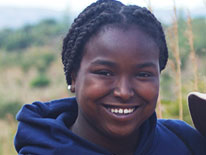Through Eastern's partnership with BuildOn, six students were able to travel to Malawi this past summer to help build a school in Guchi, Malawi. Below, four of the students reflect on their experience.
Follow along and see their trip through Flickr's photo map.
Guchi's location is an approximation due to a lack of mapping data in Malawi.

Ke’Asiah M. -
Do you understand the meaning of a want or need? A want is to have a strong desire for something you do not need to live whereas a need is something that is essential for you to have. Many people in this world have the needs for them to survive and along with that many wants that are unimportant to living. Even more people cannot even maintain the needs they must have to survive. Malawi was such an amazing experience. I learned so much. One thing I learned was that you do not need materialistic things to make you happy; true happiness is living without those things.
We traveled to a village named Guchi where everyone had to just work with what they had. It was no "This person is more fortunate" or "This person has less". Everything was about survival. I went there thinking to myself," How do these people act knowing they live this life? Would they be angry or rude? Will they not be able to give us the things we need to have a comfortable stay?" It made me nervous. Boy, how they proved me wrong! They treated us all with great hospitality. When the team arrived to Guchi, we got off the bus and the villagers were singing and dancing. In that moment, we all cried tears of joy. There we were coming to their community to give them hope, and they were giving us the best welcome anyone can have. It was so touching.
Living with a host family halfway across the world from mine really made me appreciate everything I have at home. The family was extremely courteous to us and made us feel comfortable. One struggle for the Trek team and me was talking with the people in Guchi. The only terms we knew in Chichewa was "Zikomo" meaning "thank you", "Muli Bwanji" meaning "how are you?”, and "Ndili Bwino, kaya inu?" meaning "I am fine, and you?” They would shake our hands, starting a full conversation in Chichewa, and all we could do was just smile nicely, only knowing certain words in their language. Yeah, we had translators, but we did not want to keep calling for their help in the midst of a conversation with the villagers. Playing with the kids helped me realize that you did not need to speak the same language as another person to have an affect on each other's lives. We would use body language to show the concept of games, with the help of our Chichewa Phrasebooks, like "Red light, Green light", "Head-Shoulders Knees-and-Toes", etc.; they taught us a game in which they call "Champion". Body language was our only hope when communicating with the people in Malawi.
Another hard adjustment was the food. It is very different. From the white rice with egg sauce to the Nsima, it is difficult to not think "What is that?" Our Trek Coordinator told us to eat every bit of the food given to us to be respectful. Honestly, I cried after my first time trying Malawian food because it was very complicated to eat. It was already a hard adjustment to have to eat it for a few days, then I was supposed to eat all of it? It was tough, yet we got through it!
One thing that makes me happy about this Trek is that I feel we showed the people of Guchi that we are thinking of them and their future. I am happy to be able to say that I travelled to Africa and contributed to helping a community take one step forward to a better life ahead. Helping people can really make you feel good inside. I cannot write this and make it seem like we did everything for those people. They worked just as hard as we did, and I can bet any amount of money that they still are today to get that school built. Those parents are determined to see their children prosper.
I am so thankful to God for allowing me to have such an opportunity. I am grateful for the experience. Everything I did, everything I saw, every person I came to will be forever in my heart. I wish nothing but the best for the people of Guchi for their great hospitality to us.
- Ke'Asiah M.

Mahni H. -
Traveling to Malawi gave me the opportunity to broaden my horizon. Of course I had butterflies prior to being there. But when I arrived, there were a bundle of moments I refused to miss. I was taught how to mix cement, make brick windows, and to filter my water. I tasted a local dish titled Nsima, as well as sugar cane. While in Malawi, there were a few times when I was homesick, since I wasn't accustomed to their way of life but that all changed. I struggled to communicate with others since they didn't speak English; their language is called Chichewa. I learned a few greeting phrases. I mostly communicated with gestures. It seemed as if we still understood each other, and the interaction was welcomed. The village that I stayed in wasn't wealthy. But yet they all seemed to smile despite their circumstances. Everything that was used to make the school was made in the village. Cement was being made and mixed, bricks were being formed by hard sand and then fired, and windows were being molded and left to harden. You can tell that they were dedicated in making sure their children had a place of education. By living with a home stay, I was given the opportunity to walk in their shoes and experience how they had to cook, eat, bathe, and sleep. They cook on a fire of sticks, sleep on the floor, bathe in a bucket, and eat with their hands. When sitting down and reflecting on my trip, I wouldn't change nor take back anything that I did. Though it did change the person I am today. I have a different perspective on saving my resources, I appreciate more of what is done for me, and most of all I am grateful. I've always been told, " Life isn't measured by the number of breaths we take, but by how many moments take our breath away”. This trip was nothing but moments and memories that I will forever remember and cherish.
-Mahni
 Naomie W. -
Naomie W. -
I'll start off by saying being away from the city wasn't easy. From the plane ride, to the language gap, to the bathrooms, showers and the food. It was hard but I made it. It changed my life. I never flew on a plane before so that was pretty scary. When we first arrived it was really hard for me to understand the people's language. We had to use hand gestures to understand them. But I can leave knowing that I helped change someone's life and someone changed my life. Now I know that you can have a little bit and still make the best out of what you do have. They gave us the time of our lives. Just to make me feel so welcomed, so cared for, and so thankful to have around changed my life. Now I know that it's not always about wants, it's about needs. When we went to Africa we didn't see the children asking for the newest Jordans or diamond earrings. They were asking for things that they needed for their survival like rice, more meat and better water. They asked for their dreams to become a doctor, chief, or teacher to come true. They show you that anything is possible. If you work hard dreams do come true. Not only did they treat us like a team, but they treated us like their family.
– Naomie

Alexis A. -
Going to Malawi and coming back made me realize that there is more to life than having the latest Jordans and having everything you want because there are people out there that really need the resouces to provide for their family. When I got back from Malawi I looked at things so much differently and I am also very grateful for everything that I have. The people in Malawi were so nice and generous to me. My host mother put a smile on my face everyday because she took care of us in ways I can't even explain. And the thing I learned is that people in Guchi don't do nice things and expect to get something back in return, they just do it out of the kindness of their hearts. And that is something you don't see a lot where I live. So that was my experience in Malawi. Throughout the trip there were many tears and fears but the most important thing is that I learned about a new culture and had the experience of a lifetime.
-Alexis A.
Follow @EasternHS on Twitter
Follow @EasternHS on Instagram
Be a fan of Facebook.com/EasternHighSchool


